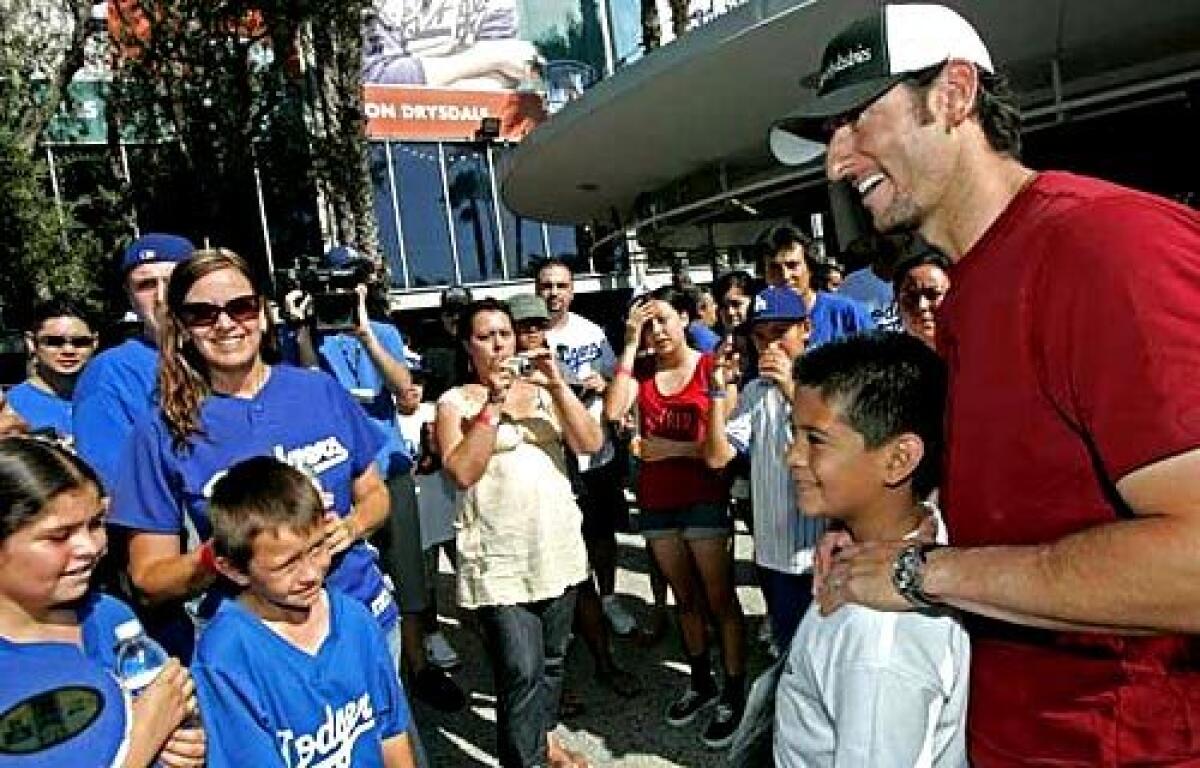Carne asada -- and Nomar -- get served up for charity at Dodger Stadium

ON a recent weekend afternoon, under a sky so vivid and crystalline it actually was Dodger blue, a group of fans filled the courtyard outside the loge decks at Dodger Stadium in Chavez Ravine for Carne Asada Sunday. They gathered -- in baseball caps and vintage Dodgers jerseys, Vin Scully’s voice still reverberating from the stadium -- for plates of carne asada tacos, a favorite of infielder Nomar Garciaparra.
Garciaparra is such a fan of carne asada that he showcases the dish at this twice-a-year event benefiting the Dodgers Dream Foundation, which provides athletic and educational opportunities for kids.
Carne asada, the classic Mexican dish of grilled marinated beef, is an emblematic food of Garciaparra’s Southern California childhood. The ballplayer grew up in Whittier and remembers weekend afternoons in his backyard, where his father, Ramon (Nomar’s name is his father’s spelled backward), would often barbecue carne asada for family and friends.
On this weekend afternoon, the year’s first Carne Asada Sunday, fans filled their plates with the aromatic beef, spice-shot and fresh from the grill; warm corn tortillas; pico de gallo and tomatillo sauce; chopped onions and minced cilantro; wedges of lime; and grilled whole serrano chiles.
For the price of a ticket and a $50 donation, fans get all the carne asada tacos, rice and beans, quesadillas (the event is sponsored by Cacique, a local Mexican cheese company) and nonalcoholic drinks they want. And, of course, a signed picture of Garciaparra -- and a chance to hang out after the game with a popular player.
A mariachi band from Baldwin Park’s Guadalajara Grill trumpeted into song. The veteran infielder paused to sign autographs, then grabbed a plate and loaded it high before sitting down to eat with his family, who make a point of coming to the events.
Garciaparra was joined by his grandmother, parents Ramon and Sylvia, and sisters Yvette and Monique. (Garciaparra’s wife, former soccer star Mia Hamm, usually comes too, but she’d kept the couple’s year-old twin daughters at home during the heat wave.)
When Garciaparra signed with the Dodgers in 2006 and returned home to Los Angeles -- after nearly eight seasons with the Boston Red Sox, where he won two batting titles, and two with the Chicago Cubs -- he began thinking of a charity event that would celebrate his Mexican American heritage. Food seemed the perfect answer.
“Carne asada was one of the things I grew up on,” Garciaparra says. “When we had family over, it was carne asada on the grill. . . . We had the radio on with the mariachis playing in the background.” During his years in Boston, Garciaparra adds, he’d have his mother bring the dish whenever she came to visit.
Now that he’s a Dodger, Garciaparra doesn’t have to wait until he visits his parents -- or his mother unpacks her suitcase -- to have his favorite food.
Garciaparra and his father consulted on the carne asada recipe (“It starts off with the meat, a good skirt steak,” Garciaparra says, “and the marinade is key”), which was developed for the event by Joseph Martin, executive chef for Levy Restaurants at Dodger Stadium.
Martin, a Pasadena native of Mexican ancestry and graduate of Pasadena’s California School of Culinary Arts, gave the Garciaparras no argument about the dish. Martin’s grandparents lived in the same Whittier neighborhood as the Garciaparras, and he spent much of his childhood there. “Every time we went to my grandmother’s house, she’d make carne asada,” says Martin.
Although you can use other cuts of beef (a flank steak, a thinly cut round steak, a butterflied tenderloin or short loin), Martin likes skirt steak, which is tender and so thin that it cooks quickly on the grill. The chef says that he tries for a marinade that’s not too spicy so that it can appeal to the fans’ various tastes.
The beef marinates overnight -- this allows the flavors to blend and deepen -- in a blend of herbs, spices, onion, garlic and tomato. Chipotles in adobo add smoke and a little heat; a generous dose of lime adds zing. “And [this year] we added more garlic and cumin than last year,” Martin says.
Carne asada is an extremely adaptable dish; it’s easy to add a little of this, a little of that, to the marinade, according to personal taste. Just combine the marinade ingredients with the steak in a bowl (or large plastic bag) and allow to marinate overnight. Then bring the meat to room temperature while the grill heats and you assemble the rest of the feast. Over hot coals or using a grill pan, the steak is done in minutes.
While you’re slicing the meat (if it’s going in tacos, coarsely chop it; it’s easier to eat), toss some whole serrano chiles on the grill for guests who want a little added heat.
“I like it spicy,” Ramon Garciaparra says. So much so that he sometimes makes a separate marinade, to which he adds some vinegar, some wine -- and lots of jalapeños.
“Somebody asked me once,” says Ramon (who is -- like the original mariachis, he points out -- from Guadalajara), “do you put chiles on your cereal? That’s where I stop.”
The Dodgers had won the game, an interleague nail-biter against the Cleveland Indians, which seemed to make everyone hungrier. With palm trees swaying on the hilltop, the San Gabriel Mountains in the distance and the mariachis playing, all the plates (blue, of course) were soon empty.
These days, when Garciaparra plays a home game, it really is home.
For reservations and information on the next Carne Asada Sunday, Aug. 3, go to www.dodgers.com/carneasada.
More to Read
Sign up for The Wild
We’ll help you find the best places to hike, bike and run, as well as the perfect silent spots for meditation and yoga.
You may occasionally receive promotional content from the Los Angeles Times.










